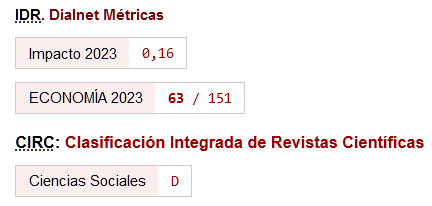La paradoja del cuidado: necesario pero invisible.
Keywords:
domestic and care works, use of time, caring timeAbstract
This paper reconstructs the itinerary covered, in the last decades, by the feminism thought about domestic and care work including a discussion about it’s conceptual and empirical dimension. Both perspectives show the same difficulties to conceptualize, measure and value care work, in particular, the more invisible subjective dimension. Both perspectives show the same difficulties to conceptualize, measure and value care work, in particular, the subjective dimension which is the most invisible one. Therefore, we urgently need to develop new methodologies to show and quantify these elements in order to introduce them into the economic analysis.
Downloads
References
ADAM, BARBARA (1999): "Cuando el tiempo es dinero. Racionalidades del tiempo y desafíos a la teoría y práctica del trabajo", Sociología del trabajo, 37, p.5-38, Madrid.
AMOROSO, MARÍA INÉS ET AL. (2003): Malabaristas de la vida. Mujeres, tiempos y trabajos. Icaria, Barcelona.
BAKKER, ISABELLA (1998): Unpaid Work and Macroeconomics: New Discussions, New Tools for Action, Ottawa: Status of Women Canada.
BECKER, GARY (1965): "A theory of the Allocation of Time", Economic Journal, 75, Nº299, p. 493-517.
https://doi.org/10.2307/2228949
BECKER, GARY (1981): Treatise on the Family, Harvard University Press, Cambridge Mass.
BORDERÍAS, CRISTINA Y CRISTINA CARRASCO (1994): "Introducción" en Cristina Borderías, Cristina Carrasco y Carmen Alemany, Las mujeres y el trabajo. Rupturas conceptuales, Fuhem-Icaria, p.17-109.
BOSCH, ANNA, CRISTINA CARRASCO Y ELENA GRAU (2005): "Verde que te quiero violeta. Encuentros y desencuentros entre feminismo y ecologismo", Epílogo al libro de Enric Tello, La historia cuenta, Ed. El Viejo Topo, p. 321-346.
BUDLENDER, DEBBIE, RHONDA SHARP Y KERRI ALLEN (1998): How to Do A Gender-Sensitive Budget Analysis: Contemporary Research and Practice, London: Commonwealth Secretariat.
CARRASCO, CRISTINA (1991): El trabajo doméstico. Un análisis económico, Ministerio de Trabajo y Seguridad Social, Colección Tesis Doctorales, Madrid.
CARRASCO, CRISTINA (1996): "Presente y futuro del trabajo. Apuntes para una discusión no androcéntrica", en Arantxa Rodríguez et al., El futuro del trabajo: reorganizar y repartir desde la perspectiva de las mujeres, Bakeaz/CDEM, p. 19-46, Bilbao.
CARRASCO, CRISTINA (2001): "La sostenibilidad de la vida humana: ¿un asunto de mujeres?", Mientras Tanto, Nº 82, p. 43-70.
CARRASCO, CRISTINA ET AL. (1997): Mujeres, trabajos y políticas sociales: una aproximación al caso español, Serie Estudios, Nº51, Instituto de la Mujer, Madrid.
CARRASCO, CRISTINA Y MARIBEL MAYORDOMO (2000): "Los modelos y estadísticas de empleo como construcción social: la encuesta de población activa y el sesgo de género", Política y Sociedad, Nº 34, p. 101-112.
CARRASCO, CRISTINA ET AL. (2004): Trabajo con mirada de mujer, Consejo Económico y Social, Madrid.
CARRASCO, CRISTINA, MÀRIUS DOMÍNGUEZ Y MARIBEL MAYORDOMO (2005): El trabajo de las mujeres en Cataluña ¿hacia una creciente igualación? Informe realizado para el Consell de Treball, Econòmic i Social de Catalunya a partir de la información de la Encuesta de Empleo del Tiempo 2002/2003.
DURÁN, MARÍA ÁNGELES (1999): Los costes invisibles de la enfermedad, Fundación BBV, Madrid.
ELSON, DIANE (1997): Gender-Neutral, Gender-Blind, or Gender-Sensitive Budget?: Changing The Conceptual Framework to Include Women's Empowerment and The Economy of Care, Preparatory Country Mission to Integrate Gender into National Budgetary Policies and Procedure, London: Commonwealth Secretariat.
ELSON, DIANE (2000): "Households Structures and Nutrition: Some Contradictions in Provisioning Norms, en Susan Himmelweit (ed.) Inside the Household: From Labour to Care, Houndsmills, Macmillan.
FLORO, MARÍA SAGRARIO (1995): "Economic Restructuring, Gender and the Allocation of Time", World Development, vol. 23, Nº11, p.1913-1929. https://doi.org/10.1016/0305-750X(95)00092-Q
FOLBRE, NANCY (2001): The Invisible Heart: Economics and Family Values. New York: The New Press.
FOLBRE, NANCY Y MICHAEL BITTMAN (2004): Family Time, Routledge.
HIMMELWEIT, SUSAN (1995): "The Discovery of "Unpaid Work": The Social Consequences of the Expansion of "Work". Feminist Economics, 1(2), p.1-19. https://doi.org/10.1080/714042229
HIMMELWEIT, SUSAN (2002): "Making Visible the Hidden Economy: The Case for Gender-Impact Analysis of Economic Policy", Feminist Economics, 8(1), p. 49-70. https://doi.org/10.1080/13545700110104864
HUMPHRIES, JANEYHILL RUBERY (1984): "The Reconstitution of the Supply Side of the Labour Market: the Relative Autonomy of Social Reproduction", Cambridge Journal of Economics, vol. 8 (4), p. 331-346. https://doi.org/10.1093/oxfordjournals.cje.a035554
IZQUIERDO, MARÍA JESÚS (1998): El malestar en la desigualdad, Madrid: Ed. Cátedra.
MELLOR, MARY (2000): "Challenging the New World (Dis)Order: Feminist Green Socialism" en Susan Himmelweit, Inside the Household. From Labour to Care, MacMillan Press, p. 166-183.
MESSING, KAREN (2002)(dir.): El trabajo de las mujeres. Comprender para transformar, Ed. Catarata.
PÉREZ OROCO, AMAIA (2005): "Economía del género y economía feminista, ¿conciliación o ruptura?", ponencia presentada al primer Congreso de Economía Feminista del Estado español, Bilbao, 14-15 de abril de 2005.
PICCHIO, ANTONELLA (1992): Social Reproduction: the Political Economy of the labour market. Cambridge University Press. Cambridge.
PICCHIO, ANTONELLA (1994): "El trabajo de reproducción, tema central en el análisis del mercado laboral" en Cristina Borderías, Cristina Carrasco y Carmen Alemany, Las mujeres y el trabajo. Rupturas conceptuales, Fuhem-Icaria, p. 451-490.
PICCHIO, ANTONELLA (2001): "Un enfoque macroeconómico "ampliado" de las condiciones de vida", en Cristina Carrasco (ed.)
PICCHIO, ANTONELLA (2005): "La economía política y la investigación sobre las condiciones de vida" en Gemma Cairó y Maribel Mayordomo (comp.), Por una economía sobre la vida. Aportaciones desde un enfoque feminista, Icaria, p.17-34.
REID, MARGARET (1934): Economics of Household Production, John Wiley, New York.
TORNS, TERESA (2001): "El tiempo de las mujeres: entre la invisibilidad y la necesidad" en Cristina Carrasco (ed.) Tiempos, trabajos y género, Publicacions Universitat de Barcelona, p. 133-147.
TORNS, TERESA (2004): "Las políticas de tiempo: un reto para las políticas del estado del bienestar", Trabajo. Revista de la asociación Estatal de RRLL y CCTT, Nº 13. https://doi.org/10.33776/trabajo.v13i0.146
Downloads
Published
How to Cite
Issue
Section
License
This licence allows third parties to share (copy and redistribute the material in any medium or format) and adapt (remix, transform and create from the material for any purpose, including commercial purposes), provided that authorship and first publication in this journal (The Journal, DOI of the work) is acknowledged, a link to the licence is provided, and it is stated whether changes have been made to the work.







